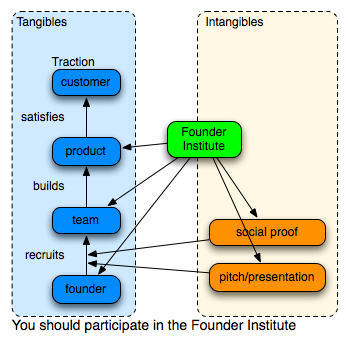
Founder Feedback gives you insights from the startup trenches.
In a post on his blog, Mike Thompson, Founder of Kimerit, analyzes a recent Founder Showcase keynote speech by Naval Ravikant, and explains the strategy he is employing to become a "fundable startup" in the least amount of time. You can read the full post on Mike's blog here. Below is an excerpt.
"Naval Ravikant of AngelList and Venture Hacks gave an excellent keynote, entitled ”The Anatomy of the Fundable Startup,” at last (June's) Founder Showcase. Naval broke down the 5 main qualities of an “exceptional startup,” in the following order:
- Traction
- Team
- Product
- Social Proof
- Pitch/Presentation
And while all these qualities are important, Naval explained, the most important thing is to understand that “investors are trying to find the exceptional outcomes, so they are looking for something exceptional about the company. Instead of trying to do everything well (traction, team, product, social proof, pitch, etc), do one thing exceptional. As a startup you have to be exceptional in at least one regard.”
The presentation got me thinking about the strategy by which we can most quickly achieve “fundability” with Kimerit. In other words, what’s the highest-ranked quality in which we can achieve “exceptional” status in the shortest time (and via the highest probability pathway, for those of you playing the risk-adjusted home game).
Re-sorting the qualities by the order in which they are typically achieved, the founder(s) recruits a team to build a product that satisfies a customer need (where satisfaction yields traction in the form of customer adoption and growth). Before attempting to woo investors, social proof and pitch/presentation skills can also help in recruiting.

For now I’m ignoring distribution, where marketing one’s product to customers could also benefit from social proof and pitch/presentation skills.
If we maximize for the ranking of the quality versus time to achieve that quality, it appears that assembling an exceptional team is the quickest way to become fundable. What kind of teammates should one recruit? Of course the details depend on the product being built and the customers being served, but I think the reasons that investors value good teams can give some general guidelines. A smart, skilled and hard working team is more likely to:
- identify an attractive market opportunity,
- draft an intelligent strategy by which to capture the opportunity,
- build the right product to address the opportunity,
- and adjust/pivot until reaching product/market fit.
Founders with domain expertise who have previously served that market are better equipped to succeed in tasks #1 and #2. If there is any significant product risk, investors will want to see founders who have built a similar product (#3). Founders who have worked together before are more likely to persist and flex together during pivots (#4). If all else fails, a good team can be sold to a Google or Facebook to recoup the investment - therefore, a highly technical team in general has more value.
However, what if you can’t build an exceptional team? Perhaps you’re a first-time founder who lacks social proof. Maybe you’re missing that “it”-quality to inspire others to join your mission. What if you have the technical chops to build an exceptional product (or a good product that yields exceptional traction) more quickly than you can assemble an exceptional team? There is sufficient technological leverage available now that many founders are choosing to go it alone.

One risk that the pre-funded solo founder faces is the temptation to get early revenue by directly engaging early customers in a service relationship. If skipping the team is simplifying, how much easier would it be to skip the product too?! Building a general technology solution is wicked hard! This must be why consulting (and other forms of prostitution) are so popular - one can simply sell oneself as the product.

However, in order to build a scalable business starting with a service business, one has the task of working the process in reverse - first productizing the service then building the business infrastructure (team) to scale the product. It seems that to be fundable, you eventually need all of the qualities in some degree.
I think the game gets more interesting for companies with an asymmetric business model - where revenue is generated by selling ads to customers trying to reach your users, selling data on your users to your customers, etc. In principle, exceptional traction in this case means both user adoption and customer engagement or commitment, raising the bar for companies pursuing such a model. Selling customers on the company’s vision often requires pitch/presentation skills and social proof.

In contrast, investors in the Silicon Valley and SF are more risk tolerant, so companies based there can often raise money based on user traction and the assumption that customers and revenue will emerge later. I think that in the Bay Area it’s easier to build a company with an asymmetric model than one with a symmetric model that serves the same users, because charging for the product increases the barrier to achieving exceptional user traction.

So what else can you do to accelerate the process of building your company? If you’re a novice founder, I highly recommend participating in the Founder Institute program. You will:
- enhance your pitch/presentation by working with mentors to develop a deeper understanding of your opportunity,
- begin to build social proof by developing relationships with those mentors,
- get feedback in the early stages of product development,
- and perhaps even meet team members through the shared experience.

Finally, I highly recommend watching the presentation by Naval:
Kimerit, a scientific knowledge management platform that enables research funding organizations to reward scientists for rapid communication and collaborative research, is a Graduate of the San Diego Founder Institute. You can also follow Kimerit on Twitter @Kimerit, or follow Mike Thompson @mjtco.
Like this article?
Subscribe to our Weekly NewsletterAttend a Free Startup Event



